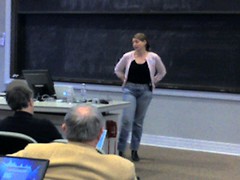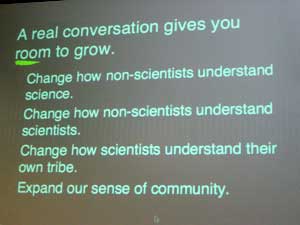[Moblogged]
 That last one got kinda long, so I’ve started a new post for the next session, presented by Janet Stemwedel. Janet has degrees in both science and philosophy. This is going to be fun. The first thing she did was to take a picture of the audience. Here blog is called Adventure in Ethics & Science.
That last one got kinda long, so I’ve started a new post for the next session, presented by Janet Stemwedel. Janet has degrees in both science and philosophy. This is going to be fun. The first thing she did was to take a picture of the audience. Here blog is called Adventure in Ethics & Science.
She says that real communication is conversation. It should not result in what she calls the Spinach Dip Blowoff. Traditional science communication consists of peer reviewed literature, conference presentations, and press releases, all of which enjoy some back-and-forth. But it isn’t true conversation. Science is a process, not a product — and by necessity, it requires conversations between scientists.
So why would a blog be helpful to scientists. It’s usually a back-and-forth in a much shorter time-scale than with traditional publishing. It’s also less ephemeral than non-virtual conversations. They stay up there. You are using real words that stay there. The conversation is quick but it is also extended. Also, it become possible to involve people from many backgrounds and many places.
She suggests that much more scientific conversations are happening in the public today, though she’s not sure if it is because of the emerging blogosphere or the current political polarized climate of this day and time. An interesting question!
 |
| This is important. Its about professional conversations where professionals grow. |
She also suggests, somewhat reluctantly, that blogging can be a way of holding what might be considers virtual meetings. Concerns include plagiarism of their work and other issues. She is now displaying a blog called, In the Pipeline, a blog written by a professional industry chemist. She suggests that any chemistry majors should be reading this blog.
She suggests that perhaps the most helpful type of blogging a scientist could engage in is conversations about the tribe, sharing what it is to be a scientist. How are things now. How might we change them. This is especially true among students — and she says that an extraordinarily high portion of science bloggers are women.
What makes blogging different?
- ability to build a virtual community i
- Audience of the willing
- option to control disclosure of personal details. (not sure exactly what that means!)
The down side?
- How do I deal with my “real” environment?
- Who’ll read this? (echo chamber vs. pitched battle)
- Who’s an authroity? ***
- What if I get dooced? (you might get fired — some bloggers did not get tenure)
Hmmm! One member of the audience just confessed that she blogged anonymously as a grad student because she didn’t want her advisory to think that she was goofing off. Janet suggested that at least with tetris, you have a high school to show for it. She later says that it’s not goofing off. It’s engaging! It’s conversation!
A good session!
In closing she suggests that science teachers should have their students blog, that she sees this more in the humanities, but we need to see it in the sciences.
Technorati Tags : warlick science education sciencebloggingconference
